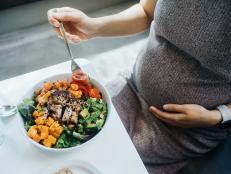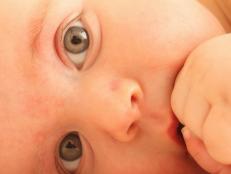Pregnancy May Speed Up a Woman’s Biological Aging, Study Finds
Does having kids add years to your life?


d3sign
Pregnancy is a transformative experience. It’s filled with excitement, anticipation, and of course — a lot of worry. For the mom-to-be, it’s a journey that brings profound changes to their bodies and minds. Seriously, my feet grew a whole shoe size when I was pregnant. Talk about profound change. While the grand prize at the end is your adorable newborn, a new study suggests that mom will be dealing with more sleepless nights and allowing her body to heal after giving birth because pregnancy might also be linked to faster aging on a molecular level?
According to a recent study published in the Proceedings of the National Academy of Sciences (PNAS) pregnancy may speed up biological aging in women.
First things first, what exactly is epigenetic aging? Unlike the chronological age that we celebrate with each birthday, epigenetic age refers to changes in our DNA that can provide clues about our biological age. These changes, known as epigenetic modifications, can influence how our genes are expressed, and they can be influenced by a variety of factors including lifestyle, environment, and significant life events like pregnancy.
For the study, researchers looked at over 1,735 detailed analyses of DNA samples from a diverse group of women living in the Philippines. They compared the epigenetic age of women who had experienced pregnancy with those who had not, aiming to understand how pregnancy might influence biological aging.
"We found that women who had been pregnant showed signs of accelerated epigenetic aging compared to those who had never been pregnant," says Dr. Andrea Baccarelli, a co-author of the study.
So, what’s causing this accelerated epigenetic aging? The study authors give several possible explanations. First, pregnancy is a time of immense physiological change, marked by hormonal shifts, increased metabolic demands, and stress on various bodily systems. These factors could contribute to epigenetic modifications that accelerate aging.
Dr. Emily Smith, another co-author of the study, says "The stress and demands placed on the body during pregnancy might lead to changes at the molecular level, accelerating the biological aging process." This suggests that the very act of nurturing new life might come with hidden costs for the mother’s body.
While the idea of accelerated aging might sound alarming, researchers say, it’s important to put these findings into perspective. Epigenetic changes don’t necessarily mean immediate health problems. So, no need to panic. They are markers that might indicate a higher risk for certain conditions, but they don’t determine a decline in your health.
However, understanding these changes can help women focus on their health, especially after pregnancy and many years later. For instance, postpartum care could include more focus on managing stress, maintaining a healthy diet, and getting regular exercise to potentially mitigate some of the effects of accelerated aging.
If you’re pregnant or if your partner is pregnant and you’re wondering what you can do, here are a few tips.
Prioritize Self-Care: Taking care of your physical and mental health is crucial. Make time for activities that help you relax and rejuvenate, whether it’s a walk in the park, yoga, or a hobby you love.
Healthy Eating: A balanced diet rich in fruits, vegetables, whole grains, and lean proteins can support your body’s recovery and overall health. Omega-3 fatty acids, found in fish and flaxseeds, are particularly beneficial for reducing inflammation.
Stay Active: Regular physical activity can help manage stress, improve mood, and support your body’s recovery. Aim for at least 30 minutes of moderate exercise most days of the week.
Seek Support: Don’t hesitate to ask for help from family, friends, or healthcare professionals. Whether it’s childcare assistance or talking to a therapist, support can make a big difference in managing stress and maintaining your well-being.
Regular Check-Ups: Keep up with regular medical check-ups to monitor your health. Discuss any concerns with your healthcare provider and stay informed about changes in your body.
YOU MIGHT ALSO LIKE:















